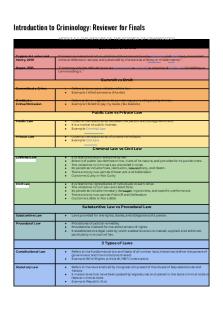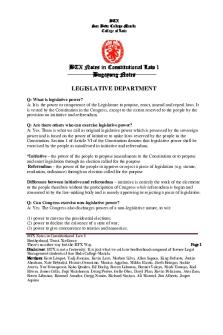GNED07 Finals Reviewer Midterm Exam PDF

| Title | GNED07 Finals Reviewer Midterm Exam |
|---|---|
| Author | Jasmin Ubaldo |
| Course | The Contemporary World |
| Institution | Cavite State University |
| Pages | 6 |
| File Size | 82.6 KB |
| File Type | |
| Total Downloads | 62 |
| Total Views | 378 |
Summary
Finals Reviewer Notes GNED 07 THE CONTEMPORARY WORLD Ms. Mary Roselle C. Gana, MPolSc Demography study of a population dynamics based on the following factors: age, gender, race, marital status, number of children, occupation, annual income, education level... for the purposes of policy development,...
Description
Finals Reviewer Notes GNED 07 THE CONTEMPORARY WORLD Ms. Mary Roselle C. Gana, MPolSc 1. Demography study of a population dynamics based on the following factors: age, gender, race, marital status, number of children, occupation, annual income, education level… for the market research
purposes of policy development, and economic
The big 3 of Demography Births Death Migration The process through which produce population stability or change 2. Diversity the degree of differences in identifying features among members of a purposefully defined group Is the understanding that an individual is unique and recognizes the individual differences Importance of diversity helps dispel negative stereotype and personal biases about different groups 3. Mobility
the ability to move freely. Traversing from one point to another point
4. Migration the movement from one place to another with the intentions of settling permanently or temporarily at a new location Importance of Migration Sustain economic growth Rise out of the current recession Transfer of manpower and skills Provides the needed knowledge and innovation for global growth Types of Migration 1. Internal Migration moving within a state, country, or continent 2. External Migration moving to a different state, country, or continent 3. Emigration leaving one country to move to another Reasons for migration 1. Voluntary Migration Better services
Good climate
2. Involuntary or Forced migration Crop failure Drought Flooding Lack of safety
High crime Lack of services
Poverty War
5. Refugees a person who has been forced to leave their country in order to escape persecution, war, or natural disaster 6. Global Interdependence between countries
refers to worldwide mutual dependence
The idea that countries must work together to provide each other goods and services. Example Oil and natural interdependence between the nations and those that do not have enough
gas
have created global major producing
7. Global Trade known as international trade, is simply the import and export of goods and services across international boundaries. Goods and services that enter into a country for sale are called imports. Goods and services that leave a country for sale in another country are called exports 8. Free Trade a pact between two or more nations to reduce barriers to imports and exports among them. Under a free trade policy, goods and services can be bought and sold across international borders with little or no government tariffs, quotas, subsidies, or prohibitions to inhibit their exchange. 9. Global Economy
that has emerged
developing to operate
is the world economy or the worldwide economy. the system of trade and industry across the world due to globalization. the way in which countries' economies have been collectively as one system.
10. Poverty is a state or condition in which a person or community lacks the financial resources and essentials for a minimum standard of living. Poverty means employment is so low that be me
that
the income level from basic human needs can't
11. Inequality characterized by the existence of unequal opportunities and rewards for different social positions or statuses within a group or society. refers to the unequal distribution of income, wealth, and material good 12. Contemporary Global Governance is a continuous process of balancing different interests and initiating cooperative action
and identification
basis for the coordination of national policies of shared norms and rules. Examples financial market regulation through the Bank for International Settlements guidelines for multinational enterprises set by the Organization for Economic Cooperation and Development (OECD).
Also initiate joint action and bring resources together, as is the case in the International Monetary Fund (IMF) and the World Bank Group. Forms of Global Governance International agreements (such as the trade rules of the GATT and GATS) International organizations such as the World Trade Organization (WTO), the World Bank, and the International Monetary Fund (IMF) loose groupings (such as G7 and G20) informal discussion fora (like the World Economic Forum Types of Global Leadership Transformational Leadership a leadership approach that causes change in individuals and social systems. In its ideal form, it creates valuable and positive change in the followers with the end goal of developing followers into leaders.
Elements Individualized Consideration, Intellectual Stimulation, Inspirational Motivation, and
Idealized Influence. goals and boundaries 13.
Transactional Leadership works within set established organizational
Power of the Nation-State Power Nation
manifests the following Strength force/ assertion driving force Authority ability/capacity/capability to do Influence establishing followers Control to guide, lead. maneuver. instruct Superiority build high standards
2 essential elements 1. People 2. Territory Sharing the common attributes of 1. descent 2. culture 3. language 4. history
State 1. 2. 3. 4. 5. 14. Tension emotionally
4 essential elements People Government Sovereignty Territory International Relations
occurs when something is stretched either physically or
15. Conflict clash between individuals arising out of a difference in thought process, attitudes, understanding, interests, requirements and even sometimes perceptions a struggle between people which may be physical, or between different ideas 16. Violence the unlawful exercise of physical force or intimidation by the exhibition of such force 17. War a state of armed conflict between different nations or states or different groups within a nation or state. generally, involves the use of weapons, a military organization and soldiers.
a situation in which a nation enforces its rights by using force. **Not every armed conflict is a war. 18. Global Citizenship is the idea that all people have rights and civic responsibilities that come with being a member of the world, with whole-world philosophy and sensibilities, rather than as a citizen of a particular nation or place.
Global Citizen is someone who is aware of and understands the wider world - and their place in it. They take an active role in their community, and work with others to make our planet more equal, fair and sustainable.
helps young people to: Build their own understanding of world events. Importance It encourages individuals to think deeply and critically about what is equitable and just, and what will minimize harm to our planet. Help learners grow more confident in standing up for their beliefs, and more skilled in evaluating the ethics and impact of their decisions. 19. Global Sustainability defines the conditions under which humans and nature, societies and the biosphere, the world and the Earth can co-exist in ways that enable productive harmony, stability and resilience to support present and future generations Five Principles Enhance Liveability Create opportunities for economic prosperity Foster environmental responsibility Embrace design excellence Demonstrate visionary leadership and strong governance
20. Global Ethical Responsibility the ability to recognize, interpret and act upon multiple principles and values according to the standards within a given field and/or context. Examples: Collaborations/ teamwork Service learning Volunteerism
partnerships/
social/political action activities, community advocacy, social advocacy. leadership roles. ethical training certificates. teaching others, conducting trainings, leading workshops.
maintaining —even improving— your bottom line, while setting a high bar for making a positive contribution to society....
Similar Free PDFs

Finals- Reviewer
- 9 Pages

Rizal-Midterm-Reviewer for Exam
- 31 Pages

Finals Reviewer Psychology
- 17 Pages

Reviewer for ITC (Finals)
- 50 Pages

ROTC Finals Reviewer
- 6 Pages

NEGO Finals Reviewer
- 24 Pages

Lecture Reviewer Finals
- 4 Pages

Midterm - Reviewer
- 4 Pages

Prelim, midterm finals
- 10 Pages

Constitutional Law 1 Finals Reviewer
- 64 Pages
Popular Institutions
- Tinajero National High School - Annex
- Politeknik Caltex Riau
- Yokohama City University
- SGT University
- University of Al-Qadisiyah
- Divine Word College of Vigan
- Techniek College Rotterdam
- Universidade de Santiago
- Universiti Teknologi MARA Cawangan Johor Kampus Pasir Gudang
- Poltekkes Kemenkes Yogyakarta
- Baguio City National High School
- Colegio san marcos
- preparatoria uno
- Centro de Bachillerato Tecnológico Industrial y de Servicios No. 107
- Dalian Maritime University
- Quang Trung Secondary School
- Colegio Tecnológico en Informática
- Corporación Regional de Educación Superior
- Grupo CEDVA
- Dar Al Uloom University
- Centro de Estudios Preuniversitarios de la Universidad Nacional de Ingeniería
- 上智大学
- Aakash International School, Nuna Majara
- San Felipe Neri Catholic School
- Kang Chiao International School - New Taipei City
- Misamis Occidental National High School
- Institución Educativa Escuela Normal Juan Ladrilleros
- Kolehiyo ng Pantukan
- Batanes State College
- Instituto Continental
- Sekolah Menengah Kejuruan Kesehatan Kaltara (Tarakan)
- Colegio de La Inmaculada Concepcion - Cebu





